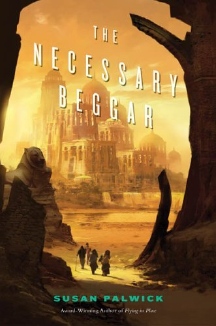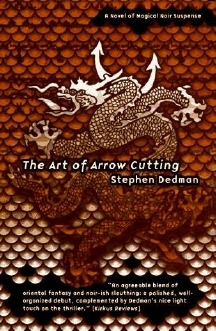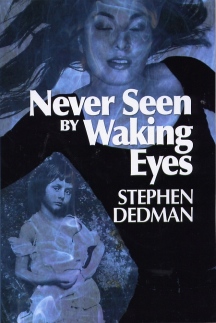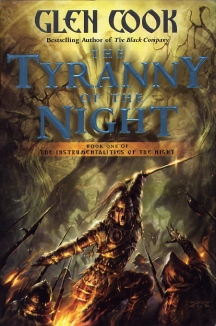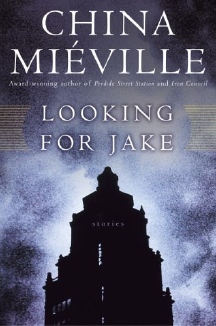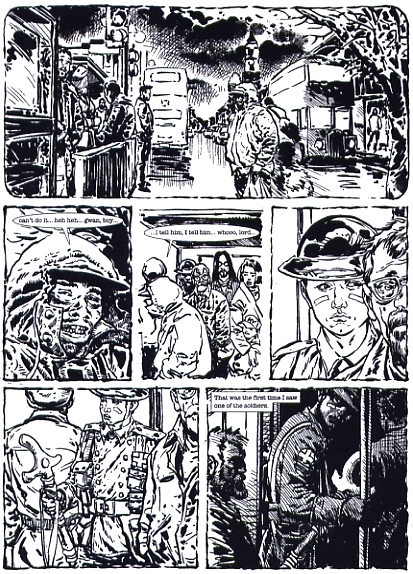|
|
|
This Just In...News from the Agony Column
|
07-01-05: Susan Palwick Returns |
|||
'The
Necessary Beggar'
Susan Palwick's first
novel, 'Flying in Place' came out in 1992, and caused something of a
stir. It was a well-written feminist ghost story about incest, which
certainly
explains the stir part. Remember, it was only in 1991 that Andrew Vachss
published 'Sacrifice'. While he had already established that child abuse
could be a valid literary subject, his work was quite shocking. So
Palwick's feminist spin was still an eye-opener.
So far, you have
what seems to be a pretty typical fantasy setup, and you might expect
at this
point that this other dimension includes hobbits
and
elves, or one of the many other appurtenances of modern generic fantasy.
Toto,
I dont think we're in Gondor. |
|
06-30-05: Undercurrents |
|||
An
Interview With Andrew Vachss
'Two Trains Running' is something of a departure for Andrew Vachss, and he told me that it took him a long time to write. It eschews his usual focus on crimes committed against children for a look back at the year 1959, when the forces that run the world today first began to take shape. He gives you a nearly real-time look at a huge cast over two weeks in a rip-roaring 450 page stripped-down set of newsreels. He turns himself into a surveillance camera and reports just what he sees, what his characters do. The story is quite complex and full of fascinating undercurrents. Putting together what happens and why is the most enjoyable job a reader could have. It's no wonder it took him years to write. In between, he worked on Burke novels, and other projects including his 'Underground' series of stories set in a world where life on the surface has become an actual hell -- all because journalism went away. He sees himself as a journalist, and his story is rightfully the stuff of legend. Hearing him tell of his journey from the US Public Health Service to his private practice dedicated to serving and saving children is utterly terrifying. I have to warn potential listeners that he describes scenes that will set your teeth on edge. This is certainly the most disturbing interview I've ever conducted. But Vachss is ultimately inspiring and surely a force for positive change. He kicks ass and takes no prisoners. I talked to him for almost an hour, and I've already uploaded MP3 and RealAudio files of our conversation. I dont know how much of this will make it onto radio; it's pretty raw stuff. But make no mistake: Andrew Vachss is one of the most powerful voices of our generation. Do not miss this interview. But listen alone, so you can sort yourself out afterwards. You might not be able to look yourself in the mirror right away. After all, we're only human. |
|
06-29-05: Stephen Dedman Describes Things 'Never Seen By Waking Eyes' |
||||||
Short,
Strange and Obscure
Dedman followed up his opener with a science fiction novel, 'Foreign Bodies', in 1999, and in 2003 published 'Shadows Bite', the inevitable vampire-oriented sequel to 'The Art of Arrow Cutting'. Tor brought you all three, and they're readily available in paperback should your interest be piqued. Probably the best way to do so is to invest in Dedman's forthcoming short story collection 'Things Not Seen by Waking Eyes' (Infrapress.com ; August 2005 ; $15.95 Trade Paperback). Like many writing some spin of speculative fiction, Dedman keeps his tiller in the water with short stories, and the 24 stories that comprise this collection all appeared in places that readers are rather unlikely to have seen them; and if seen, here they are nicely put together in an attractive trade paperback.
The stories here offer a wide variety of settings, styles, influences and presentations, with a bit of a focus on the sensual, the surreal and the disturbing. Lots of our favorite subjects get an outing; Cthulhu gets a two-page joke with a great punch line in 'Reveille', Lewis Carroll gets a drive-by in the title story, Poe and Van Helsing make the grade in 'The Facts of Dr. Van Helsing's Case' and 'The Lady of Situations' offers the upsetting upshot of childhood abuse. You have seen those eyes. Given that there are 24 stories in 223 pages, readers should understand that the stories are on the short side. Infrapress.com offers a very nice trade paperback printing; fat pages and big type add up to a sturdy book that's easy to read. Design on a dime by Paula Guran is effective if not overwhelming. But it's important to note that the heart behind Darkecho is involved in this effort. If you're a fan of Guran's 'Darkecho', then chances are very good you'll find something to like here. 'Never Seen by Waking Eyes' is probably not only the title of the book, but an indication of its fate, in that youre certainly not going to find piles of this next to the Stephen King trade paperback re-prints at Generic_Chain_Bookseller. It will certainly show up at your local specialty shop -- and if it doesn't, bug them to order it. It's more than fitting that 'Never Seen by Waking Eyes' strikes me as a perfect bedstand book. |
|
06-28-05: Glen Cook Greets 'The Tyranny of the Night' |
|||
A
New Hardcover Series from Tor
With plenty of monsters. The backstory here is that the world is surround by walls of ice, behind which the forces of night -- lots of monsters -- wait, plot, plan and drool a little hoping for a snack, big, little, in-between, they're not picky. They certainly dont do much to distinguish between the human forces that are clashing over the Wells of Ihrain. These wells are the source of magic and therefore power. Think of oil, magic, money -- it all comes down to the same thing in the end, power of one individual over another and of one country over another. The patriarchs have the Wells, the Parmans want them. Else is the warrior who is sent on a mission to the Holy Land -- where the Wells are, of course. He accidentally kills a creature of the Dark, a minor god, and thus sets the critter of darkness against him. So you've got your sort of new-era fantasy, and no Hobbits in sight anywhere. Sorcerers you'll find aplenty, accompanied by maidens and monsters. By basing his world on an amalgam of 12th century Europe and its neighbors, Cook offers hope that the names wont degenerate into fantasy gobble-de-gook. Else, his questing, questioning hero is asked to address the follies of war. While the follies of war are pretty obvious here and now, we still seem enamored enough to get ourselves caught up. And of course with out utter, total escape fiction, we do like to have at least the pretense of relevance. Of course, since we are surrounded by monsters in the night, modern-day Crusades and bucket-loads of fantasies about war, perhaps one might be inclined to think the book overly relevant. Raymond Swanland provides a classic Frazetta-style cover that effectively grabbed my eye in the store the first time I saw it. Cook works in big bold strokes that match the cover art. He comes out swinging and slugging. This is hard-to-miss fantasy that will stop your schooling and keep you drooling until the next installment comes out, presumably in about a year's time. But it will still be new then as well, or at least in paperback. Until then, heres our band-new Glen Cook. And dont worry, there's always that back-catalogue to dig through if you read the hardcover. |
|
06-27-05: China Miéville is 'Looking for Jake' |
||||||
Short Stories to Mind the Gap
'Looking for Jake' is a collection of short stories by Miéville, only one of which visits his most famous creation. Instead, you have Miéville the here-and-now surrealist in full bloom, and if you've not encountered any of these stories before, you're in for a very pleasant bit of shock therapy. Many -- but not all -- the stories here have been published elsewhere, in venues ranging from McSweeney's Enchanted Chamber of Astonishing Stories ('Reports of Certain Events in London') to Socialist Review ('Tis the Season'). And the Miéville you will find here is, to my mind, is exactly the writer youd expect to find behind the grotesque and wildly imaginative visions of Bas-Lag. A profoundly insightful and very human writer. This collection features fifteen short stories, four of them brand new and never before published. Here's how it breaks down. We have the aforementioned 'Reports of Certain Events in London' from the McSweeney's deal, and I'm pretty sure most of my readers will have seen this. 'Tis the Season' comes from Socialist Review, but was, I believe, linked somewhere on the Internet for a while. All of us should have 'Details' from the reliably great anthologist John Pelan's recent Lovecraftian binge, 'The Children of Cthulhu'. And shame on anyone who hasnt yet picked up Jeff VanderMeer's and Mark Roberts' 'The Thackery T. Lambshead Pocket Guide to Eccentric and Discredited Diseases', where you'll find the story here called 'Entry Taken from A Medical Encyclopedia'. (Not least because it includes two entries by yours truly, yon editor, Dr. Frederick John Kleffel.) Note the title change from 'Buscard's Murrain' in the 'Lambshead Guide', as it will give you a bit of insight into the way the publisher -- and Miéville himself -- are spinning this collection. That 'Entry...' shift suggests a rather Borgesian slant to the stories here, and you'd be one hundred percent right-on in assuming that to be true. Miéville is writing the kind of gently surreal gems that Jorge Luis Borges specialized in, every bit as literary, every bit as perfectly pitched. To see the Borges connection most clearly, one need only look to 'The Tain', the longest entry, first published in a standalone (and now very hard-to-find) novella version by PS Publishing. It ends with a long quote from Borges' 'The Book of Imaginary Beings', something I recently nabbed in a cost-friendly first edition. A goodly portion of people will have read 'Familiar' in 'Conjunctions, 39: New Wave Fabulists'. (Remember that teapot tempest, all the hullabaloo about "Is it or is it not a 'movement'?") But there are a number of stories from far less familiar sources. 'Different Skies' came from 'Britpulp!', 'An End to Hunger' from 'The New English Library Book of Internet Stories' and 'Looking for Jake' from 'Neonlit', edited by the wonderful Nicholas Royle. 'Foundation' is a controversial story about atrocities in Iraq that first saw publication in 'The Independent on Sunday' "Talk of the Town Magazine", and quickly became, well -- the talk of the town. Miéville is passionately polemically political, and when you back that up with the kind of whip-saw talent that can pop out novels like 'Perdido Street Station' you're certain to get the goats of those whose goats need getting. Surely you know someone to whom you can hand this story just to get them riled. Do so now, it's you literary duty. And then finally, the four stories we havent seen. 'The Ball Room', co-written by Emma Bircher and Max Schaefer, is a tale about those rooms full of balls that you'll find, for example, in the McDonald's Playland out in Lost Hills, where Highway 46 meets Highway 5 in the center of nowhere in California. Urban paranoia haunts 'The Go Between'; get out your Dennis Etchison collections. 'Jack' offers a brief, potent visit to New Crobuzon.
The idea being that when you get right down to it, this is certainly not a cash-cow for the publisher to carry you over till the next novel, whatever that may be. In my interview with him, Miéville indicated that it won't (most likely) be a Bas-Lag/New Crobuzon novel, but he was loath to talk about it, and I understand this. I've met many a writer who has that sort of superstition, who would prefer not to talk about what theyre working on. Its only appropriate that one of our most potent writers of fables, one of those who seeks to document the superstitions and the gap between our dreams and our day-to-day drudgeries should live in the realms he writes about. We can only wait for his next return, anticipating his reports of certain events in the regions that only he is able to visit. The places we all live, but never see. |
